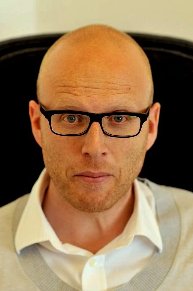A dog bites a man… no one cares. But how about a man biting a dog? That’s news. Dr. Kristoffer Nimark explores economic events that make news, and how media focus can exacerbate the impact of those events. Dr. Nimark lectured at CERGE-EI this fall about his research, and also sat down for a brief interview. Check it out:
 Why did you choose to become an economist?
Why did you choose to become an economist?
I started to become interested in economics in the 90s. When I was in high school we had a big economic crisis in Sweden, not unlike the crisis we have now in Spain. And I saw the public debate where people had differing views that were irreconcilable with each other. I wanted to learn economics so I could understand it myself and see which arguments were valid. So I started my undergrad studies in Sweden and later I continued with my PhD at the EUI (The European University Institute) in Florence.
What is your current research?
Mostly my research is about methodological issues about how to model economies where individual agents know different things about things that all the agents care about. So you can think about how a lot of economic decisions depend on the actions of other agents in an economy. For example, if you’re a firm that wants to invest, you would like to know how much your competitors are investing; or if you’re a trader in the stock market or bond market you might be interested in knowing what other traders are willing to pay for a bond at the next trading opportunity.
Once agents have different information, predicting other peoples’ actions becomes more difficult, because you don’t know the same things anymore. And I’m trying to solve these models on how to predict the actions of others. I may want to predict the actions that other agents are taking, and they are trying to predict the actions that I am taking. And since their actions will depend on their expectations of my actions, I need to form predictions about their predictions of my expectations. So we run into methodological issues and try to understand how to solve these dilemma models.
In the paper you presented at CERGE-EI (‘Man-Bites-Dog Business Cycles’) you proposed some information structures which are different from the existing literature on ‘rational inattention.’ Can you tell us about it?
So my paper “Man-Bites-Dog Business Cycles” features one specific feature of news media: unusual events are considered more ‘newsworthy’ than more common events. The title of the paper refers to how when a dog bites a man it is normal, but it is unusual when a man bites a dog. It is only the latter event that will make news.
In the context of the paper, this means that when you have unusual macroeconomic developments like a crisis or a boom, the mainstream media is more likely to focus on the economy. Since the news media is more likely to focus on the economy when we have a recession or a boom, it influences the business cycle. In particular, I show that this intense media focus can exacerbate things—you get stronger booms and recessions than you would otherwise.
Very interesting. What are your main conclusions?
My main finding is that the economy appears to respond strongly to shocks that don’t seem large enough to really justify the types of crises we observe. The model shows how we have sometimes extremely strong responses to only small changes in fundamentals. So even if there is only a small change in productivity, you have a very large change in output, and vice-versa. And this can be partly explained by the intense media focus.
So in this sense, the media focus on the economy is a bad thing?
I don’t show in the paper that this is suboptimal. It’s still possible that this media response is good, that a strong response is appropriate. I don’t really discuss this.
We students are making decisions about our topics for our PhD thesis. Where is the gap in economic research today?
You shouldn’t think too much about it. When you choose a topic as a PhD student you should choose something that you find interesting enough to work on—something you are willing to spend 60-70 hours a week on it for three years. Some people find it’s interesting to work on new things and they’ve identified some gaps in economic thinking they think are important. And I think that’s great, and that’s often very good research. But you shouldn’t artificially look for gaps, especially if you don’t find it interesting—and you won’t be able to convince other people that it’s interesting!
The most important thing is to work on something you find interesting yourself. Most people don’t think it’s interesting to repeat other people’s work, so in one sense it always means plugging some gap somewhere.
Dr. Nimark is a researcher at CREI (Centre de Recerca en Economia Internacional), adjunct professor at Universitat Pompeu Fabra, and affiliated professor at Barcelona GSE.
Read the paper Man-Bites-Dog Business Cycles
Interviewer: Sophio Khozrevanidze, 2nd Year PhD Student
Friday, 5 October 2012

